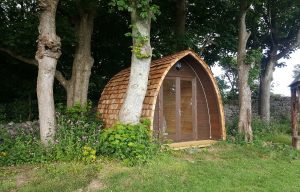WORKING IN THE GARDEN?
If you have limited space (and privacy) in your home for an office or workspace, then you might be one a growing group of people who are considering creating an outbuilding in the garden. Bob Johnstone takes a look at the pros and cons of building an office in your garden and what sort of tax relief will you be entitled to on the cost of the structure and its running costs.

These days a popular alternative to converting a garage or loft to use as a home office is a ready-made or DIY outbuilding that is located in your garden. But as well as the structure itself, there are several factors to consider including the tax consequences.
Ready-made or DIY?
There’s a growing market in ready-made garden office buildings and an online search will provide you with a wide range of options and prices to choose from. However, if you are good at design and DIY, you could even choose to build a tailor made one from scratch. But in either case planning permission isn’t usually required and there’s no difference in the tax treatment of the cost of installing a ready-made office or building your own structure.
Tax deductions for installing or building?
The bad news is that even though a garden office is a moveable item it counts as a structure from which your business operates rather than an item of equipment. As a result none of the costs of a DIY construction or the purchase price of a ready-made office is deductible from your business profits.
Design and other costs directly associated with building and installing the office, including delivery charges, count as part of the cost of the structure and therefore are also not tax deductible from profits. Unfortunately, the cost of initial decoration falls into this category too.
ADVICE
Fixtures and fittings
The normal tax rules apply to the cost of furniture such as curtains and blinds, furniture, fixings such as shelves and systems, which you add to the structure. This means a deduction for capital allowances (CAs) can be claimed.
Thermal insulation
The cost of thermal insulation fitted or built into the office also qualifies for capital allowances even where it forms part of the structure.
Annual investment allowance
Where the cost of furniture and so on is within the annual investment allowance, the whole amount qualifies for a tax deduction for the financial year in which it is incurred.
Running costs
The cost of heating and lighting the office is tax deductible. Repairs including redecoration costs, are also tax deductible.
VAT
The good news is that the VAT rules regarding structures differ from those for Income Tax and Corporation Tax. It can be reclaimed on not just the running expenses, but also the cost of building your own or buying a ready-made structure.
Selling the Structure
Usually you won’t have to worry about tax if or when you sell the structure, either by itself or with your home, because it will probably be worth less than the cost of the structure, meaning that there’s no profit or gain to tax. And even if it’s worth more, any gain is likely to be exempt from Capital Gains Tax.
SUMMARY
The actual cost of building or buying a ready-made office for your garden isn’t tax deductible from your business profits. However, tax deductions (capital allowances) can be claimed for thermal insulation, furniture and fixtures and deductions are also allowed for repairs, lighting and heating costs. With all of this in mind, an office in the garden could provide a very good alternative for those of you who choose to work from home.
